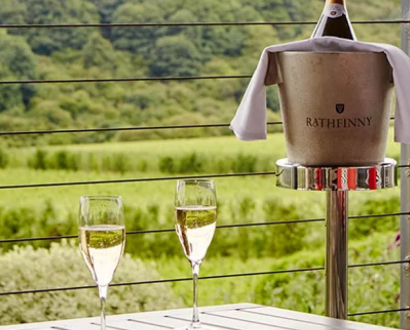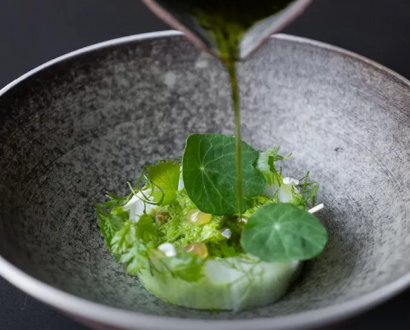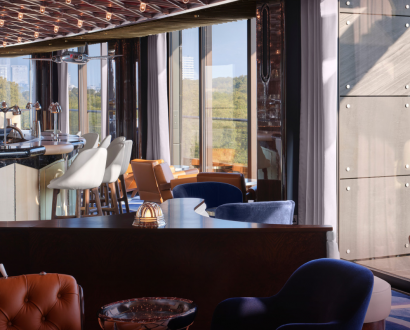Natural, elegant and driven by the landscape is the ethos behind the wines of winemaker Nav Singh and former sommelier and journalist Louise Radman. Lured by the promise of the nation’s finest cold-climate terroir, the pair founded Domaine Simha in Tasmania in 2012. Their ambition is to craft wine that speaks of the place and season in which it is grown.
Nav honed his skills in some of the world’s most prestigious estates, including Domaine de L’Arlot in Burgundy, Chateau Le Pin in Bordeaux and Chandon in Australia. The focus is on showcasing single vineyard terroir in the Derwent Valley.
Nav describes Tasmania as the ultimate fine wine terroir. “Tasmania is Australia’s most exciting wine frontier,” he says. “The natural advantages here are unparalleled. It’s like standing on the brink of a new world where everything is possible.”
Nav led an avant-garde approach to winemaking in Tasmania, embracing natural methods like foot pigéage, wild fermentation and maturation in clay amphorae and large demi-muid oak barrels.

He harvests on fruit and flower days according to the lunar cycle and leaves the wine on fine lees for many months. While he holds oenology and viticulture qualifications from the University of Adelaide, Nav’s natural ethos is shaped by intuition and lo-fi technique. His wines are basket pressed and bottled unfined and unfiltered. The pair believe this hands-on way of crafting wine encourages purity and brings them closer to the essence of the vineyard.
Made in micro-batches, a limited number of Domaine Simha wines are made each season. They are sought by collectors and sommeliers, featuring in restaurants like Quay, Aria, Rockpool, Ester, Attica, Automata, Poly and Dinner by Heston.

The duo moved to Tasmania from South Australia to seek the ideal terroir for the styles of wine they love. “The cold climate and ancient geology of Tasmania is rare and special,” explains Louise.
“Tasmania’s cold environment and sunshine allows grapes to ripen slowly over a long period and retain natural acidity. It’s perfect for chardonnay, pinot noir and riesling, along with varieties like gamay.
“We love the graceful, aromatic styles of wine and spirits cold climates bring,” she says.
“The wines produced closely reflect the character of the season and hand of the maker. Capturing that uncertain, ethereal magic takes our breath away.”
Travelling the world and tasting different varieties and styles of wine is what influenced Louise and Nav to focus on natural processing.
“We wanted to explore those avenues in Australia and see what the wine would be like,” Louise says. “It’s how they would have made wine hundreds of years ago. Using clay amphorae and older oak gives us wines of subtlety and layers.”
The clay vessels also negate the need for modern technological interference. Louise explains the egg-shaped amphorae maintain a naturally stable temperature, creating their own convection current that eliminates the need for external cooling. She adds, “We are stripping back the layers and getting to the purest essence of the grape.”
According to Nav, clay is a breathable vessel that lends texture and minerality while allowing the fruit to shine. It brings out the best in the wine.
“When you close your eyes and taste and smell a wine, if it takes you to a special place on a hillside in Tasmania or France or wherever it may be – that, to us, is the most exciting and compelling thing about wine.”
Australia’s technological advancements have evolved to make wine of higher quality during the past thirty years. Now, winemakers are taking that knowledge and using it to strip things back to push the boundaries.
“That’s where we are now,” says Louise. “There’s a lot of excitement and new, young energy coming into wine. There are many small producers, of which we’re one. We’re interested in seeing what can be done if we try different styles and techniques.”
The main element for Domaine Simha is to make wine with a sense of place, Louise adds. “It is the French concept of terroir, which is expressing the climate, geography and traditions of a particular region.” As they move into the higher tiers of wines, they are specifically drawn from particular plots and older vines within a single vineyard.
“When you close your eyes and taste and smell a wine, if it takes you to a special place on a hillside in Tasmania or France or wherever it may be – that, to us, is the most exciting and compelling thing about wine. That expression is what we believe we can harness by making wines naturally in Tasmania.”
“Wine is generally a career of love, not money. This is the lifestyle we have chosen to embrace.”
Small business is hard. But for Louise and Nav, the feeling of independence makes it all worthwhile.
“If we have an idea, we can make it happen right away,” she says. “We don’t have to ask for permission or forgiveness. We’re rigorous in our standards, in our approach to quality and our commitment to doing things at the highest level. That level of commitment does take a toll on a small business, but it is at the heart of what we do.”

Louise continues, “It also involves making sure we manage the business end of the company in the best possible way, not only from the perspective of quality of production but also how we nurture our employees and create mutually beneficial, ongoing supplier and stakeholder relationships.”
Additionally, Louise notes, “We cultivate meaningful relationships within the community. The wine community in Tasmania is very collaborative, so we are able to join with other small businesses on idea sharing, events and promotions.
“Fostering these connections with people of a like-minded approach has been valuable for us as a small business.”
The vision at Domaine Simha is to continue building the Tasmanian brand. It’s about promoting Tasmania so the world will recognise the quality and attributes of Tasmanian wine.
“We have no aspiration to grow. We want to be artisan, we want to be small, we want to make high-quality products of the most compelling character,” she says. “We’re always looking to push boundaries in terms of new styles within our environment, new techniques and discovering our part of the world.”
According to Nav, “Our vision is to continually improve and seek out knowledge. We want to deliver wines of energy, value and sustainability at the highest level.”
With interest in Domaine Simha increasing and the wines already sold at high-end restaurants throughout Australia as well as Hong Kong, Singapore and the UK, staying small might be a challenge.
“We believe an artisan business model will be rewarding and sustainable over the long term,” says Louise. “Wine is generally a career of love, not money. This is the lifestyle we have chosen to embrace.”
This month is the annual Domaine Simha fine wine release. Look out for the Domaine Simha Rama Pinot Noir from the outstanding 2018 vintage.
Read next: Tantalise your tastebuds in the best wine regions of 2019







